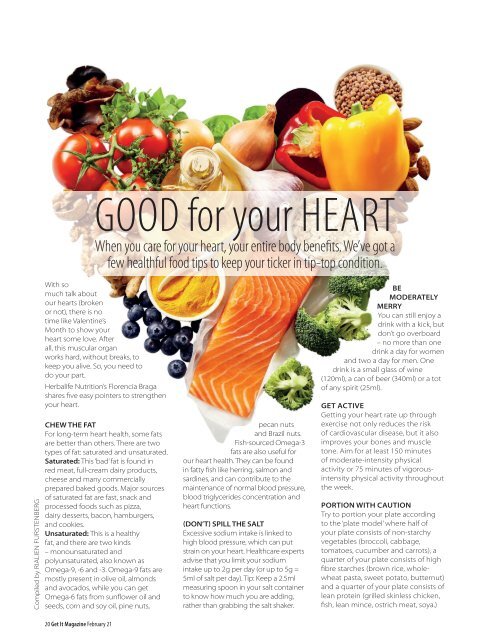Pretoria - Feb 2021
Share the love
Share the love
Create successful ePaper yourself
Turn your PDF publications into a flip-book with our unique Google optimized e-Paper software.
GOOD for your HEART<br />
When you care for your heart, your entire body benefits. We’ve got a<br />
few healthful food tips to keep your ticker in tip-top condition.<br />
Compiled by RIALIEN FURSTENBERG<br />
With so<br />
much talk about<br />
our hearts (broken<br />
or not), there is no<br />
time like Valentine’s<br />
Month to show your<br />
heart some love. After<br />
all, this muscular organ<br />
works hard, without breaks, to<br />
keep you alive. So, you need to<br />
do your part.<br />
Herbalife Nutrition’s Florencia Braga<br />
shares five easy pointers to strengthen<br />
your heart.<br />
CHEW THE FAT<br />
For long-term heart health, some fats<br />
are better than others. There are two<br />
types of fat: saturated and unsaturated.<br />
Saturated: This ‘bad’ fat is found in<br />
red meat, full-cream dairy products,<br />
cheese and many commercially<br />
prepared baked goods. Major sources<br />
of saturated fat are fast, snack and<br />
processed foods such as pizza,<br />
dairy desserts, bacon, hamburgers,<br />
and cookies.<br />
Unsaturated: This is a healthy<br />
fat, and there are two kinds<br />
– monounsaturated and<br />
polyunsaturated, also known as<br />
Omega-9, -6 and -3. Omega-9 fats are<br />
mostly present in olive oil, almonds<br />
and avocados, while you can get<br />
Omega-6 fats from sunflower oil and<br />
seeds, corn and soy oil, pine nuts,<br />
pecan nuts<br />
and Brazil nuts.<br />
Fish-sourced Omega-3<br />
fats are also useful for<br />
our heart health. They can be found<br />
in fatty fish like herring, salmon and<br />
sardines, and can contribute to the<br />
maintenance of normal blood pressure,<br />
blood triglycerides concentration and<br />
heart functions.<br />
(DON’T) SPILL THE SALT<br />
Excessive sodium intake is linked to<br />
high blood pressure, which can put<br />
strain on your heart. Healthcare experts<br />
advise that you limit your sodium<br />
intake up to 2g per day (or up to 5g =<br />
5ml of salt per day). Tip: Keep a 2.5ml<br />
measuring spoon in your salt container<br />
to know how much you are adding,<br />
rather than grabbing the salt shaker.<br />
BE<br />
MODERATELY<br />
MERRY<br />
You can still enjoy a<br />
drink with a kick, but<br />
don’t go overboard<br />
– no more than one<br />
drink a day for women<br />
and two a day for men. One<br />
drink is a small glass of wine<br />
(120ml), a can of beer (340ml) or a tot<br />
of any spirit (25ml).<br />
GET ACTIVE<br />
Getting your heart rate up through<br />
exercise not only reduces the risk<br />
of cardiovascular disease, but it also<br />
improves your bones and muscle<br />
tone. Aim for at least 150 minutes<br />
of moderate-intensity physical<br />
activity or 75 minutes of vigorousintensity<br />
physical activity throughout<br />
the week.<br />
PORTION WITH CAUTION<br />
Try to portion your plate according<br />
to the ‘plate model’ where half of<br />
your plate consists of non-starchy<br />
vegetables (broccoli, cabbage,<br />
tomatoes, cucumber and carrots), a<br />
quarter of your plate consists of high<br />
fibre starches (brown rice, wholewheat<br />
pasta, sweet potato, butternut)<br />
and a quarter of your plate consists of<br />
lean protein (grilled skinless chicken,<br />
fish, lean mince, ostrich meat, soya.)<br />
20 Get It Magazine <strong>Feb</strong>ruary 21


















